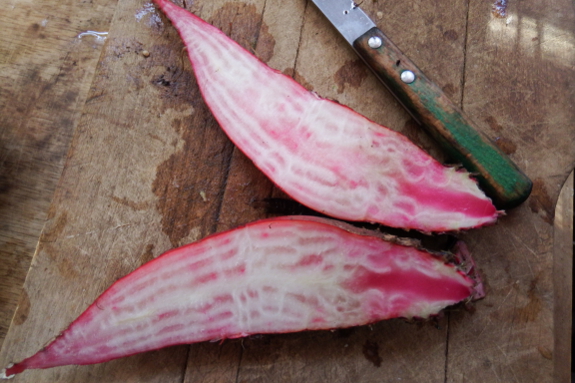
Mangel taste test

How does Abigail like small mangels that were recently harvested?
She hates them!
We're hoping maybe a month of
curing will make them more delicious.
Want more in-depth information? Browse through our books.
Or explore more posts by date or by subject.
About us: Anna Hess and Mark Hamilton spent over a decade living self-sufficiently in the mountains of Virginia before moving north to start over from scratch in the foothills of Ohio. They've experimented with permaculture, no-till gardening, trailersteading, home-based microbusinesses and much more, writing about their adventures in both blogs and books.
Want to be notified when new comments are posted on this page? Click on the RSS button after you add a comment to subscribe to the comment feed, or simply check the box beside "email replies to me" while writing your comment.

Since I have never heard of Mangel, I looked it up in Google and found this information: Mangelwurzel
From Wikipedia, the free encyclopedia
Mangelwurzel
Scientific classification
Kingdom: Plantae (unranked): Angiosperms (unranked): Eudicots (unranked): Core eudicots Order: Caryophyllales Family: Amaranthaceae Subfamily: Betoideae Genus: Beta Species: B. vulgaris
Binomial name
Beta vulgaris L.
Mangelwurzel or mangold wurzel (from German Mangel/Mangold and Wurzel, "root"), also called mangold,[1] mangel beet,[1] field beet,[2] and fodder beet, is a cultivated root vegetable derived from Beta vulgaris. Its large white, yellow or orange-yellow swollen roots were developed in the 18th century as a fodder crop for feeding livestock.
Usage[edit]
Contemporary use is primarily for cattle, pig and other stock feed, although it can be eaten – especially when young – by humans. Considered a crop for cool-temperate climates, the mangelwurzel sown in autumn can be grown as a winter crop in warm-temperate to sub-tropical climates. Both leaves and roots may be eaten. Leaves can be lightly steamed for salads or lightly boiled as a vegetable if treated like English spinach. Grown in well-dug, well-composted soil and watered regularly, the roots become tender, juicy and flavourful. The roots are prepared boiled like potato for serving mashed, diced or in sweet curries. Animals are known to thrive upon this plant; both its leaves and roots providing a nutritious food. Mangelwurzel may require supplementary potassium (potash) for optimum yields, flavour and texture, and foliage readily displays potassium deficiency as interveinal chlorosis. In 19th-century American usage they were sometimes referred to as 'mango.'
The 1830 book The Practice of Cookery includes a recipe for a beer made with mangelwurzel.[3]
In tradition[edit]
The mangelwurzel has a history in England of being used for sport,[4] for celebration, for animal fodder and for the brewing of a potent alcoholic beverage.
In South Somerset, on the last Thursday of October every year, Punkie Night is celebrated. Children carry around lanterns called "Punkies", which are hollowed-out mangelwurzels. Mangelwurzels are also carved out for Halloween in Norfolk and Wales.[citation needed]
John Le Marchant recommends cutting the "mangel-wurzel" to learn the proper mechanics for a draw cut with the broadsword in his historic manual.
In popular culture[edit]
It is the source of the name for the English folk/pop/comedy/scrumpy-and-western musical group The Wurzels.
English comedian Tony Hancock made a short song about mangelwurzels in The Bowmans episode of Hancock's Half Hour.
The mangelwurzel is featured in the 1984 novel Jitterbug Perfume written by Tom Robbins. The main character Alobar originally hails from a Slavic nation where beets are quite prevalent, and eventually the mangelwurzel is used as the base note in the mysterious perfume from which the book derives its name.
The mangelwurzel also had a role in the cult TV kids show as Worzel Gummidge's head, where it could often be heard to say things like "go boil your head."
Mangels are a frequently mentioned animal fodder in George Orwell's novel, Animal Farm.
Mangel wurzel is the only vegetable that was available for Sarah Bruckman to purchase in Two Fronts by Harry Turtledove. Turtledove also uses it as a staple of the post-eruption Maine diet in his Supervolcano series.
Food shortages in Europe following World War I caused great hardships, including cases of mangel-wurzel disease, as relief workers called it. It was a consequence of eating only beets.[5]
Hope this information helps those who are as ingnorent as I!